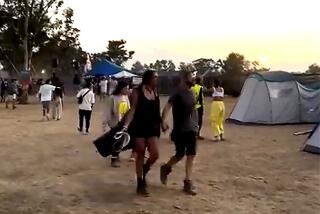Review: Jennifer Koh and the ‘Shared Madness’ of coming between a violinist and her violin
The hills are again green. However much the town remains traumatized by devastating fires and mudslides, Santa Barbara looks like Santa Barbara. You would never mistake its manicured beauty as being a distant sixth New York City borough.
But it sort of felt that way Friday night in St. Anthony Chapel. Not the lovely chapel itself, originally part of a Franciscan seminary founded in 1880 and nestled in the serene hills above downtown. But the recital by violinist Jennifer Koh, titled “Shared Madness” and featuring the West Coast premiere of 14 solo pieces by mostly New York composers, seemed straight out of Brooklyn, where it was first given two years ago. The program reached the West Coast thanks to UC Santa Barbara’s imaginative Arts & Lectures series, which uses venues around town.
In fact, once sleepy Santa Barbara has become a destination for performance as well as for its coastline. Arts & Lectures recently snared this season’s one West Coast recital of opera star Joyce DiDonato. Next week it will present the California premiere of Mark Morris’ new Beatles ballet, “Pepperland.”
Elsewhere, the town’s symphony and opera companies appear newly energized, while the Music Academy of the West, the training program in Montecito, has become wildly ambitious. Among the academy’s more than 200 events this summer will be the beginning of a four-year residency with the London Symphony Orchestra, Gustavo Dudamel conducting Mahler’s Second Symphony with the academy’s student orchestra in a community concert ($10 tickets and kids free) and a staging of “The Marriage of Figaro,” with James Conlon conducting.
Koh’s Friday recital would surely have felt special any place, given her ability to hold an audience spellbound for 90 nonstop minutes of new music. But unique to Santa Barbara was the venue’s sense of spiritual remove, magnificently enhanced by a reverberant enveloping acoustic that gave Koh’s violin a lustrous aura.
And then there was that violin. The other draw of the recital, its “shared madness,” was the role of community when something tries to get between a violinist and her instrument.
Years ago, Koh lost a fine violin that had been lent to her since she was 15, the violin on which she won major competitions and built her career. The owners could no long afford the instrument. With the help of Esa-Pekka Salonen, Koh found another multimillion-dollar fiddle she could live with for the rest of her life. But she had to take out a loan with punishing interest rates to purchase it.
It proved unaffordable, and just when Koh had despaired that she would never be able to pay off the debt, she happened to meet Orange County new music patrons Elizabeth and Justus Schlichting at one of her Santa Barbara Bach recitals. They offered to help. The violinist suggested paying them back on installment, asking composer friends to write solo pieces for her — 21st century Paganini-style etudes that she would offer the couple.
The project, Koh told the St. Anthony audience, became a “celebration of the generosity of the community of composers.” In the end, she wound up with 32 pieces, requiring two full evenings to perform. (This was Part 1). The composers range in age from their early 30s — Sam Adams, Zosha Di Castri and Timo Andres — to John Harbison, who turns 80 in December. The idea was that each piece would be a virtuoso caprice that was about the violin and the violinist.
What has proved fascinating is how differently composers see Koh. Her stage manner suggests a mesmerizing stateliness, easygoing, yet intense. Without flamboyance, she reveals a capacious range of expressive possibilities. Some know her for her Bach, Beethoven, Sibelius and Tchaikovsky. Others think of her and Bartók. Yet her dedication to new music, second to none among stellar soloists, is all over the map. She so impressed Robert Wilson, when she starred in his and Philip Glass’ latest revival of “Einstein on the Beach,” that the director is now creating a theater piece for her around the Bach solo Sonatas and Partitas.
Koh herself has more projects. One is a group of commissions for new duos that she can perform with composers. Another is a multimedia collaboration with French composer and video artist Jean-Baptiste Barrière that reflects how they are both from families torn apart by the division the Koreas in 1945.
Hence “Shared Madness” is a sharing of Koh’s vastness. She was a little coy about this in the program, playing many of the pieces with little or no break, creating an arc that is not so much about individual personalities as a natural flow. I took that as a challenge to keep track, and I pretty easily could. At some point, though, Koh might try to be really coy and hand out the program only after the concert.
She began with Adams’ “for jenny,” as if finding harmonics on her strings from a hum arising from a loudspeaker placed inside a snare drum, which remained next to her throughout the recital. That led to rubbing and sounds and glissandi (Di Castri), penetrating Bachian arpeggios (Missy Mazzoli), lingering long melodies (Andres), craggy lyricism (Augusta Read Thomas), thick trills and tremolos (Lisa Bielawa), bits of birdsong (Eric Nathan), Bartókian dance (Mark Grey), microtones (Michael Gordon), Icelandic patterning (Daníel Bjarnason) and something “Zany, Cute, Interesting” (Vijay Iyer’s love letter to Koh’s technical prowess).
Gabriel Kahane’s “The Single Art Form Is Dead” stopped the recital dead. He has her read a long, self-consciously absurd composer statement about emotional catharsis that somehow gets John Malkovich into the picture. The retort was an entrancing bluesy melody that doesn’t want to (and I didn’t want it to) say goodbye (John Harbison). The finale was Julia Wolfe’s “Spinning Jenny,” a hammering of the violin’s steel strings.
The good news is that not only does Koh now have her violin life partner but she also seems eager to make Santa Barbara a significant part of her extended community. Arts & Lectures is planning to bring the second half of “Shared Madness” in a future season as well as partner with her other projects. Brooklyn should be so lucky.
More to Read
The biggest entertainment stories
Get our big stories about Hollywood, film, television, music, arts, culture and more right in your inbox as soon as they publish.
You may occasionally receive promotional content from the Los Angeles Times.







